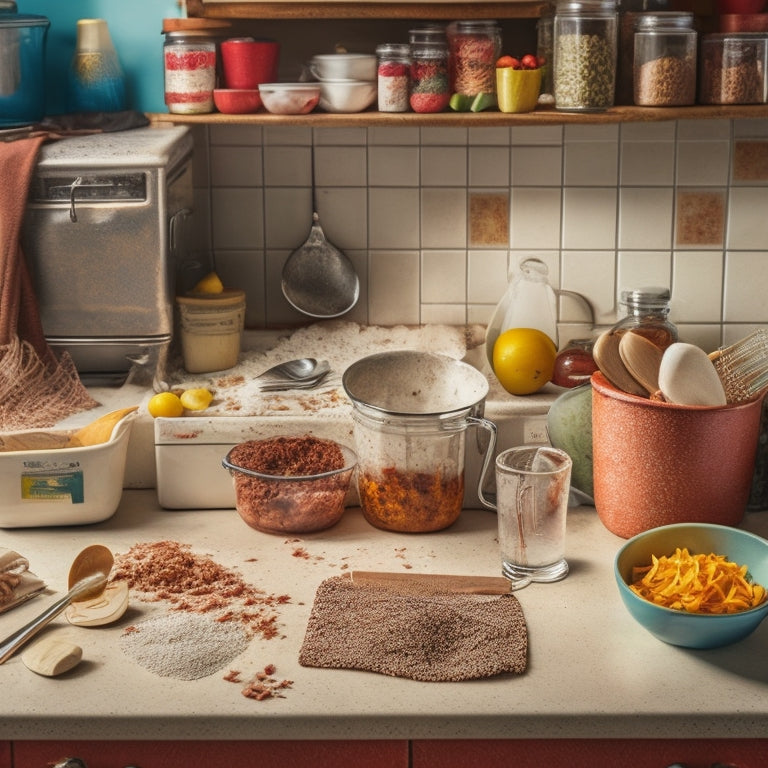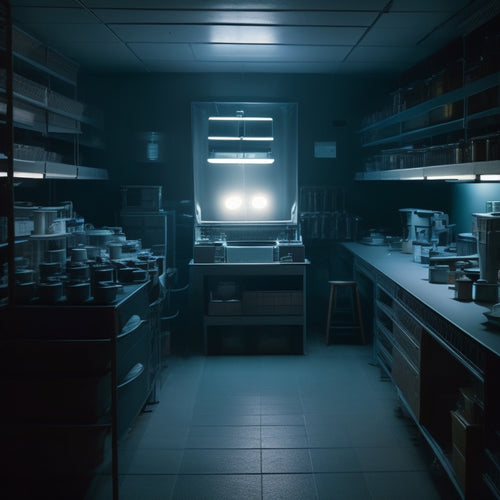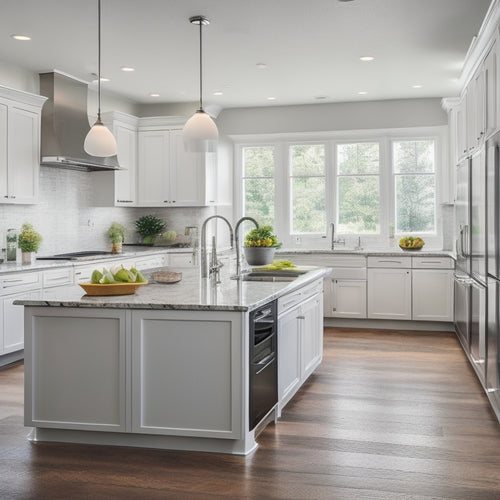
Why Cluttered Kitchen Utensil Holders Are Holding You Back
Share
You're probably wasting more time searching for utensils in your cluttered kitchen drawers than actually cooking, and that's just the start of how disorganization is holding you back. Cluttered utensil holders elevate stress levels, contribute to mental fatigue, and make you feel overwhelmed and anxious. Disorganization also leads to wasted time, inefficient use of kitchen space, and difficulty maintaining kitchen hygiene. Additionally, it affects your mental clarity, inhibits healthy cooking habits, and negatively impacts kitchen aesthetics. By streamlining your utensil holders, you'll uncover a more harmonious cooking experience - and that's just the beginning of what you'll discover.
Key Takeaways
• Cluttered kitchen utensil holders elevate stress levels, leading to mental fatigue and emotional exhaustion.
• Disorganized utensil holders waste valuable time, causing frustrating delays and decreasing kitchen productivity.
• Clutter promotes germ and bacteria accumulation, increasing infection risk and making cleaning more challenging.
• A cluttered kitchen space affects mental focus, causing divided attention, stress, and anxiety.
• Cluttered utensil holders transform the kitchen into an uninviting space, dampening inspiration and decreasing motivation to cook.
Cluttered Utensil Holders Cause Stress
You likely find yourself feeling frazzled and frustrated every time you open your kitchen drawer or cabinet, only to be greeted by a jumbled mess of utensils, which can greatly elevate your stress levels. This cluttered chaos can take a significant toll on your mental well-being, leading to mental fatigue and emotional exhaustion. The constant struggle to find what you need amidst the clutter can leave you feeling overwhelmed and anxious.
The emotional toll of cluttered utensil holders can be substantial. It's not just about the physical space; it's about the emotional weight it carries. Clutter can make you feel like you're not in control, like your life is chaotic and disorganized. This can seep into other areas of your life, affecting your relationships, work, and overall sense of well-being.
Wasted Time Searching for Tools
Cluttered kitchen utensil holders turn what should be a quick task into a frustrating search mission, costing you precious time and energy. You've been there - rummaging through a jumbled mess of utensils, only to find the one you need hiding at the bottom of the pile. This wasted time adds up, and before you know it, you've lost 10, 20, or even 30 minutes of your day.
Here are just a few ways cluttered kitchen utensil holders lead to Tool Fatigue:
-
Hidden Minutes: You spend more time searching for tools than actually cooking, adding up to hours of lost productivity each week.
-
Frustrating Delays: You're forced to pause mid-recipe, breaking your flow and momentum, as you search for the right utensil.
-
Mental Exhaustion: The constant stress of searching for tools leads to mental fatigue, making cooking feel like a chore rather than a joy.
Inefficient Use of Kitchen Space
Disorganized kitchen utensil holders occupy valuable kitchen real estate, leaving little room for essential cooking tools and ingredients. As a result, you're forced to navigate a cramped and cluttered kitchen, making meal prep a frustrating experience.
| Cluttered Kitchen | Optimized Kitchen |
|---|---|
| Wasted Space | Corner Optimization |
| Horizontal Clutter | Vertical Layout |
| Kitchen Chaos | Streamlined Cooking |
Difficulty Maintaining Kitchen Hygiene
When you're dealing with cluttered kitchen utensil holders, you're more likely to encounter germs and bacteria that accumulate on dirty utensils. These utensils can then spread infection to your food and cooking surfaces, making you and your family sick.
You know that cleaning is a chore, but with cluttered holders, it's an uphill battle that's hard to win.
Germs and Bacteria Accumulate
As you cram more utensils into your kitchen holder, germs and bacteria accumulate on the moist surfaces, creating a breeding ground for contamination. This cluttered environment increases cross contamination risks, making it challenging to maintain a clean and hygienic kitchen.
Here are three ways germs and bacteria thrive in cluttered kitchen utensil holders:
-
Hidden growth areas: Moisture gets trapped in the crevices and corners of the holder, creating an ideal environment for bacteria to multiply.
-
Utensil-to-utensil contact: When utensils are stacked tightly together, they can transfer germs and bacteria, spreading contamination throughout the holder.
-
Inadequate cleaning: Cluttered holders make it difficult to clean and sanitize utensils properly, allowing germs and bacteria to persist.
Dirty Utensils Spread Infection
You're more likely to spread infection throughout your kitchen when you store dirty utensils in a cluttered holder, allowing germs to spread quickly and quietly. This creates a breeding ground for bacteria and germs, putting you and your loved ones at risk of getting sick. The consequences can be severe, especially for vulnerable individuals like the elderly, young children, or those with compromised immune systems.
Dirty utensils in a cluttered holder also increase the risk of cross contamination. When you store utensils together, germs can easily transfer from one utensil to another, contaminating clean utensils and kitchen surfaces.
This means that even if you wash your hands regularly, you may still be spreading germs throughout your kitchen.
Cleaning Is a Chore
Cluttered kitchen utensil holders turn cleaning into a challenging task, making it difficult to maintain a hygienic kitchen environment. You're not alone if you dread cleaning up after a meal, especially when your utensil holders are overflowing with dirty utensils. This mess can lead to task avoidance, causing you to put off cleaning until it becomes an overwhelming task.
Here are three reasons why cluttered kitchen utensil holders make cleaning a chore:
-
Hidden dirt and grime: Cramped spaces in your utensil holders allow dirt and grime to accumulate, making it harder to clean and increasing the risk of bacterial growth.
-
Disorganized utensils: When your utensils are jumbled together, it's difficult to find what you need, leading to frustration and wasted time.
-
Burnout prevention: A cluttered kitchen can contribute to mental fatigue, making you feel overwhelmed and stressed. By keeping your utensil holders organized, you can prevent burnout and maintain a sense of control in your kitchen.
Unnecessary Kitchen Utensil Purchases
Your kitchen drawers and countertops are likely filled with gadgets and utensils that seemed essential at the time of purchase but now collect dust. You're not alone in this struggle. Many of us fall victim to impulse buying and novelty items that promise to revolutionize our cooking experience. But let's be real, how often do you actually use that spiralizer or egg mold?
| Reason for Purchase | Current Status |
|---|---|
| Impulse Buy | Unused and Stored Away |
| Novelty Item | Collecting Dust on the Counter |
| Seemed Essential at the Time | Forgotten in the Drawer |
Take a closer look at your kitchen utensil collection and ask yourself, "Do I really need this?" Be honest with yourself. If the answer is no, consider letting it go. Clearing out the clutter will not only free up space but also reduce stress and make cooking more enjoyable. Don't let unnecessary kitchen utensil purchases hold you back from achieving your culinary goals.
Clutter Affects Mental Clarity
Frequently, a cluttered kitchen space translates to a cluttered mind, making it difficult to focus on the task at hand. You're not alone if you've ever felt overwhelmed by the sheer number of utensils, gadgets, and tools scattered throughout your kitchen.
Clutter can have a profound impact on your mental clarity, leading to feelings of mental fatigue and brain fog.
Here are three ways clutter affects your mental clarity:
-
Divided Attention: Cluttered spaces compete for your attention, making it challenging to prioritize tasks and focus on what's important.
-
Stress and Anxiety: Clutter can trigger feelings of stress and anxiety, which can further impede your ability to think clearly and make decisions.
-
Information Overload: A cluttered kitchen can lead to information overload, making it difficult to process and retain new information.
Inhibits Healthy Cooking Habits
With a cluttered kitchen utensil holder, you're more likely to grab the nearest, convenient option, rather than opting for healthier choices. This convenience often comes at the cost of nutritional value, leading to unhealthy eating habits.
When you're surrounded by clutter, it's easy to fall into the trap of relying on processed or high-calorie foods that are quick to prepare. However, this can have long-term consequences for your health and wellbeing.
Affects Kitchen Aesthetics Negatively
When you walk into your kitchen, you're immediately hit with cluttered utensil holders that create a visual overload, making it hard to focus on cooking.
You'll notice that the chaos also makes your kitchen space feel uninviting, which can affect your mood and motivation to cook.
Cluttered Visual Overload
A cluttered utensil holder instantly overwhelms your kitchen's visual space, making it difficult for you to focus on cooking. You're not alone in this struggle. Cluttered visual overload is a common issue in many kitchens, and it's holding you back from fully enjoying your cooking experience.
Here are three ways cluttered utensil holders contribute to visual fatigue and sensory overwhelm:
-
Visual Clutter:
A cluttered utensil holder creates a messy visual landscape, making it hard for your eyes to focus on a single task. This visual clutter can lead to mental fatigue, making you feel drained and overwhelmed. -
Sensory Overwhelm:
When your utensil holder is cluttered, it can be noisy, too. The clanging of utensils, the rattling of pots and pans, and the constant visual stimulation can be overwhelming to your senses. -
Lack of Harmony:
A cluttered utensil holder disrupts the harmony of your kitchen's visual space, making it feel chaotic and uninviting. This can affect your mood and make cooking feel like a chore rather than a joy.
Uninviting Kitchen Space
Your cluttered utensil holder transforms your kitchen into an uninviting space that you dread spending time in. It's hard to feel inspired to cook or even gather with loved ones when the atmosphere is chaotic and overwhelming.
The dark ambiance created by cluttered countertops and utensil holders can make your kitchen feel like a cave, rather than a warm and welcoming hub of your home.
Moreover, a cluttered kitchen space can make you feel like you're lacking character and personality. A well-organized kitchen, on the other hand, can reflect your personal style and create a sense of pride and ownership.
When your utensil holder is cluttered, it's easy to feel like you're stuck in a rut, unable to create the warm and inviting atmosphere you desire.
Limits Kitchen Productivity
Cluttered kitchen utensil holders hinder your workflow, forcing you to waste precious time searching for the right tool amidst a jumbled mess. This disorganization not only frustrates you but also slows down your kitchen tasks. You're not alone; many home cooks struggle with cluttered utensil holders, which can lead to decreased productivity and efficiency.
Here are three ways cluttered utensil holders limit your kitchen productivity:
-
Difficulty in task prioritization: When you can't find the right tool, you're forced to pause and re-prioritize your tasks. This leads to a breakdown in your kitchen workflow, causing you to spend more time on a single task than necessary.
-
Inefficient use of time: Searching for utensils amidst the clutter takes up valuable time that could be spent on actual cooking. This inefficiency adds up, making meal prep a longer and more exhausting process.
-
Reduced motivation: A cluttered kitchen can be overwhelming, leading to decreased motivation to cook or experiment with new recipes. By decluttering your utensil holders, you can regain control of your kitchen and enjoy cooking again.
Frequently Asked Questions
Can a Cluttered Utensil Holder Affect My Kitchen's Resale Value?
When selling your home, you want to impress potential buyers. According to Appraisal Insights, a cluttered utensil holder can negatively impact Buyer Perception, decreasing your kitchen's resale value.
Are There Any DIY Solutions to Organize My Utensil Holder?
"You can create a clutter-free utensil holder by repurposing containers like mason jars or tea tins, and adding magnetic strips to store small items, making your kitchen feel more organized and peaceful."
How Often Should I Clean and Maintain My Utensil Holder?
"As you tend to your utensil holder, remember it's a reflection of your daily rhythms. Clean it daily, and implement a utensil rotation to keep essentials within reach, ensuring a harmonious kitchen flow that nurtures your sense of belonging."
Can a Cluttered Utensil Holder Attract Pests and Rodents?
You're right to wonder: a cluttered utensil holder can attract pests and rodents, creating ideal habitats for them to thrive. Rodent behavior shows they're drawn to clutter, so clean up to avoid unwanted kitchen guests!
Are There Any Benefits to Using a Utensil Holder With Separate Compartments?
As you curate your kitchen sanctuary, you'll find that a utensil holder with separate compartments is a game-changer, offering efficient storage and customization options that let you tailor your space to your unique cooking style and needs.
Related Posts
-

Boost Productivity With Free Google Sheets Templates
You can enhance your productivity exponentially by utilizing free Google Sheets templates, which offer a proven way t...
-

Mastering the Art of Darkroom Photography
You're about to enter a precise, hands-on world where you'll enhance your photographic vision into museum-quality pri...
-

5 U-Shaped Kitchen Layout Ideas to Revamp Your Space
You're about to reveal the secret to a kitchen that's both stunning and supremely functional, where every inch of spa...


